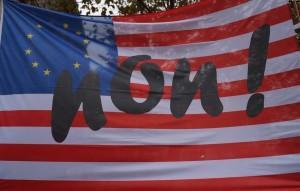Diese Woche findet die dritte Verhandlungsrunde zum TTIP (Transatlantisches Freihandelsabkommen) statt. Diskutiert wird dort unter anderem die Einbeziehung des sog. Investor-Staat-Verfahrens in TTIP. Dieses Verfahren ermöglicht es den Unternehmen, Staaten wegen vermeintlich entgangener Profite zu verklagen und auf diese Weise nationales Recht zu umgehen. Das Investor-Staat-Verfahren, das in sog. Internationalen Schiedsgerichten von Anwälten/Richtern entschieden wird, die von der Industrie bestimmt werden, finden regelmäßig völlig intransparent und hinter verschlossenen Türen statt.
Würden Investor-Staat-Verfahren via TTIP „salonfähig“ gemacht, dann wäre die Aushöhlung der Rechtssysteme der Mitgliedsstaaten die unmittelbare Folge. Angenommen, es gäbe in Deutschland ein Fracking-Verbot, dann wäre denkbar, dass ausländische Unternehmen wie Exxon Mobil, PRD, BNK, Central Anglia SA, CEP, 3Legs etc. per Internationalem Schiedsgericht dagegen klagen würden, wenn es ihnen passt. Die Erfahrung der Vergangenheit zeigt, dass sie durchaus „Recht“ bekommen könnten — auch, wenn es allen anderen wie Unrecht vorkommt.
Eine 6-Minuten-Erläuterung von MONITOR:
Annähernd 200 zivilgesellschaftliche Gruppen — Nichtregierungsorganisationen, Parteien, Gewerkschaften etc. — appellieren jetzt nachdrücklich an die staatlichen Verhandlungsführer, das Investor-Staat-Verfahren nicht im TTIP zu implementieren. Im Kern lautet die Begründung dieser Forderung:
„Investor-Staat-Verfahren zwingen Regierungen dazu, Steuergelder zu verwenden, um Konzerne zu entschädigen, die meinen, dass ihnen aufgrund staatlicher Regularien in Bereichen wie gesundheits-, umwelt-, arbeitsmarktpolitischer sowie anderer Maßnahmen Profite entgangen sind:
Das Investitionsschutzabkommen wurde schon angewendet, um saubere Energiegewinnung sowie andere politische Maßnahmen aus öffentlichen Interessen z. B. in den Bereichen Bergbau, Landschaftsschutz, Gesundheit, Arbeitsmarkt anzugreifen. De facto hängen alle 16 zurzeit laufenden Klageverfahren (Gesamtvolumen: über 14 Milliarden US Dollar) mit umwelt-, energie-, finanz-, gesundheits-, raumplanungs und transportbezogenen Regularien zusammen — die allesamt keine klassischen Handelsthemen sind.“
=======================================================
Das Schreiben
Ambassador Michael Froman
United States Trade Representative
Executive Office of the President
600 17th Street NW
Washington, DC 20508
Commissioner Karel de Gucht
Commissioner for Trade
European Commission
BE-1049 Brussels
December 16th, 2013
Dear Ambassador Michael Froman and Commissioner Karel De Gucht:
The undersigned organizations are writing to express our opposition to the inclusion of investor-state dispute settlement (ISDS) in the Trans-Atlantic Trade and Investment Partnership (TTIP).
ISDS grants foreign corporations the right to go before private trade tribunals and directly challenge government policies and actions that corporations allege reduce the value of their investments. Even if a new policy applies equally to domestic and foreign investors, ISDS allows foreign corporations to demand compensation for the absence of a ‘predictable regulatory
environment.’In recent years, the use of ISDS to challenge a diverse array of government policies has expanded dramatically. Inclusion of ISDS in free trade agreements and bilateral investment treaties has allowed corporations to file over 500 cases against 95 governments. Many of these cases directly attack public interest and environmental policies. For the following reasons, we
strongly urge you to exclude ISDS from TTIP:ISDS forces governments to use taxpayer funds to compensate corporations for public health, environmental, labor and other public interest policies and government actions: ISDS has been used to attack clean energy, mining, land use, health, labor, and other public interest policies. In fact, of the more than $14 billion in the 16 claims now pending under just U.S. free trade agreements, all relate to environmental, energy, financial regulation, public health, land use and transportation policies – not traditional trade issues.
Increasingly, corporations are using ISDS to challenge non-discriminatory government measures. For example, EU investors have attacked Egypt’s minimum-wage increase, and a U.S. corporation has attacked the Peruvian government’s decision to regulate toxic waste and close a dangerously polluting smelter under deals with ISDS. In one of the most notorious cases, U.S. tobacco giant Philip Morris launched investor-state cases challenging anti-smoking laws in Uruguay and Australia after failing to undermine the health laws in domestic courts. Particularly because of the significant number of cross-registered companies in the United States and the EU, the number of ISDS attacks on public interest policies would likely increase dramatically if TTIP includes ISDS. Governments must have the flexibility to put in place public interest policies without fear of trade litigation launched by corporations.
ISDS undermines democratic decision-making: ISDS grants foreign corporations the right to directly challenge government policies and actions in private tribunals, bypassing domestic courts and creating a new legal system that is exclusively available to foreign investors and multinational corporations. ISDS also offers corporations a venue through which to challenge domestic court decisions, further undermining domestic decision-making. In short, ISDS is a one-way street by which corporations can challenge government policies, but neither governments nor individuals are granted any comparable rights to hold corporations accountable.
European and U.S. legal systems are capable of handling investment disputes: The United States and the EU have very strong domestic court systems and property rights protections.
Inclusion of ISDS in TTIP would only provide corporations a new means to attack domestic policies deemed permissible by domestic courts. A state-to-state dispute settlement system is more than sufficient to handle investment disputes in TTIP.
These and other concerns underscore why our organizations are opposed to including investor-state in TTIP. We call on you to exclude investor-state dispute settlement from the agreement.U.S. and EU or Global:
350.org
Global Marshall Plan Initiative
Greenpeace
IBFAN
International Trade Union Confederation
Naturefriends International
Transnational InstituteUnited States
ActionAid USA
African Services Committee, U.S. and Ethiopia
American Federation of Labor and Congress of Industrial Organizations (AFL-CIO)
American Federation of State, County and Municipal Employees (AFSME)
Americans for Democratic Action
Blue Green Alliance
Center for Digital Democracy
Center for Effective Government
Center for Food Safety
Center for International Environmental Law (CIEL)
Citizens Trade Campaign
Coalition for Sensible Safeguards
Communications Workers of America (CWA)
Consumer Action
Consumer Federation of America
Consumers Union
Earthjustice
Environmental Investigation Agency
Fair World Project
Farmworker Association of Florida
Food & Water Watch
Friends of the Earth U.S.
Health GAP (Global Access Project)
Indiana Toxics Action Project
Institute for Agriculture and Trade Policy
Institute for Policy Studies, Global Economy Project
International Brotherhood of Boilermakers
International Brotherhood of Teamsters
International Fund for Animal Welfare
Knowledge Ecology International
National Association of Consumer Advocates
National Legislative Association on Prescription Drug Prices
National Wildlife Federation (NWF)
Natural Resources Defense Council (NRDC)
Oil Change International
Pesticide Action Network North America
Portland Area Global AIDS Coalition-Global South
Public Citizen
Sierra Club
Sisters of Notre Dame de Namur Justice and Peace Network
Sustainable Energy & Economy Network
United Steelworkers (USW)
Women’s Voices for the EarthEurope:
11.11.11, Belgium
Act Up, France
Africa Europe Faith and Justice Network (AEFJN) Belgium
Afrika Kontakt, Denmark
A G Post-Fossil, Germany
AITEC, France
Alliance for Cancer Prevention, UK
Amigos de la Tierra (FoE Spain)
Aquattac, Europe
Arbeiterkammer Wien (Chamber of Labour Vienna), Austria
Arbeitsgemeinschaft bäuerliche Landwirtschaft (ABL), Germany
Arbeitskreis Heckenschutz, Germany
ATTAC Austria
ATTAC Darmstadt, Germany
ATTAC France
ATTAC Germany
Attac Gruppe Schwalm-Eder, Germany
ATTAC Stuttgart, Germany
Attac Wuppertal (Agrargruppe), Germany
Austrian Trade Union Federation (ÖGB)
Baby Milk Action, UK
Bee Life European Beekeeping Coordination
Berliner Wassertisch (Berlin Watertable), Germany
Buglife – The Invertebrate Conservation Trust, Europe
BUND e.V. – Friends of the Earth Germany
Bürgerinitiative Fracking freies Hessen, Germany
Bürgerinitiative für ein lebenswertes Korbach, Germany
Campact e.V., Germany
CEE Bankwatch Network, Europe
Center for Encounter and Active Non-violence, Austria
Chaos Computer Club e.V., Germany
ClientEarth, UK, Belgium, Poland
Climate Action Network Europe
CNCD-11.11.11, Belgium
Corporate Europe Observatory, Belgium
Danish Ecological Council
Décroissance Bern, Switzerland
Deutsche Umweltstiftung, Germany
Deutscher Berufs- und Erwerbsimkerbund e.V
Deutscher Naturschutzring (DNR), Germany
DIVaN e.V., Germany
Earth Watch Media, Netherlands
Ecologistas en Acción, Spain
EcoNexus, UK and International
European Attac Network, Europe
European Environmental Bureau (EEB)
European Federation of Public Service Unions (EPSU)
European Professional Beekeepers Association
European Public Health Alliance
Fairwatch, Italy
Federation of Greek Beekeepers Associations
Forschungs- und Dokumentationszentrum Chile-Lateinamerika e.V., Germany
Friends of the Earth Europe
Gemeingut in BürgerInnenhand (GiB), Germany
Gen-ethisches Netzwerk, Europe
German Nature and Biodiversity Conservation Union (NABU), BirdLife partner, Germany
German NGO Forum on Environment and Development
Germanwatch
Gewerkschaft der Gemeindebediensteten-Kunst, Medien,Sport, freie Berufe (GdG-KMSfB),
Austria
Global Responsibility – Austrian Platform for Development and Humanitarian Aid, Austria
Health Action International
Health and Environment Alliance (HEAL), Europe
Health Care Without Harm, Europe
Health Poverty Action, UK
Ibfan Italia, Italy
Initiativ Liewensufank, Luxemburg
Initiative für Netzfreiheit, Austria
Institut za trajnostni razvoj(Institute for Sustainable Development), Slovenia
John Mordaunt Trust, UK
Keep Our NHS Public, United Kingdom
KEPKA (Consumers Protection Center), Greece
Lambeth Keep Our NHS Public, UK
Les Verts du Golfe, France
Milieudefensie, Friends of the Earth Netherlands
National Union of Teachers, UK
NaturFreunde Deutschlands, Germany
NOAH, Friends of the Earth Denmark
No Moor Fracking, Germany
ÖBV-Via Campesina Austria
Occupy London Economics Working Group, UK
Occupy London – Real Democracy Working Group, UK
One World Week-UK
Patients4nhs, UK
PELLETIER, Rhone-Alpes
PEGAH – Verein für regionale und globale Kunst und Kultur / Iranischer Kunst- und
Kulturverein, Germany
Pesticide Action Network Europe
Piratenpartei, Germany
PowerShift e.V., Germany
PRO-GE, Austria
Quercus – ANCN, Portugal
Reseau Environment Sante, France
R.I.S.K. Consultancy, Belgium
Slovene Consumers Association, Slovenia
Slow Food Deutschland e.V., Germany
SOMO, Netherlands
StopTTIP, UK
Student Stop AIDS Campaign, UK
SÜDWIND, Austria
The Berne Declaration, Switzerland
The Cancer Prevention & Education Society, England
The Danish Ecological Council
The Energy, Equity and Environment Group of Occupy London
Therapeutikum Wuppertal e. V., Germany
Tower Hamlets Keep Our NHS Public, UK
Trade Justice Movement,UK
Trades Union Congress, UK
Traidcraft Exchange, UK
Transition Town Brixton, UK
Transport & Environment
UK National Hazards Campaign, UK
Umweltdachverband, Austria
UNISON, UK
Vrijschrift, Netherlands
War on Want, UK
Wasser in Bürgerhand (WIB), Germany
Women and Development (KULU), Denmark
Women in Europe for a Common Future
World Development Movement (WDM), UK
World Economy, Ecology & Development (WEED), Germany
WWF European Policy OfficeAfrica
AIDSCARE WATCH ORG, Kenya
Center for Health Human Rights and Development, Uganda
Girls-Awake Foundation (GAF), Uganda
Treatment Action Campaign, South AfricaAsia
IBFAN-ICDC, MalaysiaLatin America
Democracy Center, Bolivia
LATINDADD



